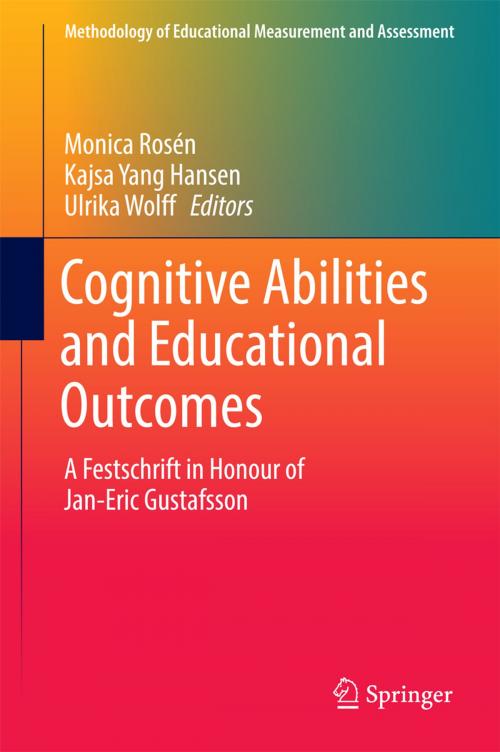Cognitive Abilities and Educational Outcomes
A Festschrift in Honour of Jan-Eric Gustafsson
Nonfiction, Social & Cultural Studies, Social Science, Statistics, Reference & Language, Education & Teaching, Educational Theory, Evaluation| Author: | ISBN: | 9783319434735 | |
| Publisher: | Springer International Publishing | Publication: | October 3, 2016 |
| Imprint: | Springer | Language: | English |
| Author: | |
| ISBN: | 9783319434735 |
| Publisher: | Springer International Publishing |
| Publication: | October 3, 2016 |
| Imprint: | Springer |
| Language: | English |
This book addresses problems and challenges that face educational measurement at a time when multipurpose usage of observational data from educational assessments, tests and international surveys has become a growing global trend. While the construction of educational measures and use of educational data offer many opportunities, they also require awareness of the numerous threats to validity and methods of reducing such threats. Written by leading international scholars, the book demonstrates the complexity of educational measurement by addressing three broad and interrelated topics. The first part discusses cognitive abilities, including studies on fluid intelligence, its improvement and its links to aptitude tests for admission to higher education. The second part focuses on the effects of school and teacher-related factors on school outcomes at individual and group levels, and uses international studies to analyze causes. The third part presents analytical techniques and measurement methods to improve reliability, for example factor analysis using Bayesian estimators, bi-factor analysis, model misfit and solutions, and discusses balance issues in reporting test results.
The book provides examples of state-of-the-art analytical techniques for pursuing fundamental research problems, and the latest advances in measurement methods, with a focus on validity improvement. Eminent researchers discuss and provide insights into questions such as: Is it possible to train individuals to think at a higher level than normal for their age? What determines prospective preschool teachers’ skill to perceive mathematics-related preschool situations? Can international indicator design and instruments be improved to use trends and national context variables more efficiently? Can indicator data at national, school and class levels be compared easier? Are value-added measures of teacher effectiveness valid when it comes to hiring and promoting teachers? Is money better spent on teacher training than on smaller class-size? How do theory and empirical statistical data intertwine in building structures of understanding?
This book is inspired by the career and personal influence of the Swedish scholar Professor Jan-Eric Gustafsson, renowned for his research on individual differences, especially the structure of cognitive abilities, and on the effects of education on knowledge and skills.
This book addresses problems and challenges that face educational measurement at a time when multipurpose usage of observational data from educational assessments, tests and international surveys has become a growing global trend. While the construction of educational measures and use of educational data offer many opportunities, they also require awareness of the numerous threats to validity and methods of reducing such threats. Written by leading international scholars, the book demonstrates the complexity of educational measurement by addressing three broad and interrelated topics. The first part discusses cognitive abilities, including studies on fluid intelligence, its improvement and its links to aptitude tests for admission to higher education. The second part focuses on the effects of school and teacher-related factors on school outcomes at individual and group levels, and uses international studies to analyze causes. The third part presents analytical techniques and measurement methods to improve reliability, for example factor analysis using Bayesian estimators, bi-factor analysis, model misfit and solutions, and discusses balance issues in reporting test results.
The book provides examples of state-of-the-art analytical techniques for pursuing fundamental research problems, and the latest advances in measurement methods, with a focus on validity improvement. Eminent researchers discuss and provide insights into questions such as: Is it possible to train individuals to think at a higher level than normal for their age? What determines prospective preschool teachers’ skill to perceive mathematics-related preschool situations? Can international indicator design and instruments be improved to use trends and national context variables more efficiently? Can indicator data at national, school and class levels be compared easier? Are value-added measures of teacher effectiveness valid when it comes to hiring and promoting teachers? Is money better spent on teacher training than on smaller class-size? How do theory and empirical statistical data intertwine in building structures of understanding?
This book is inspired by the career and personal influence of the Swedish scholar Professor Jan-Eric Gustafsson, renowned for his research on individual differences, especially the structure of cognitive abilities, and on the effects of education on knowledge and skills.















